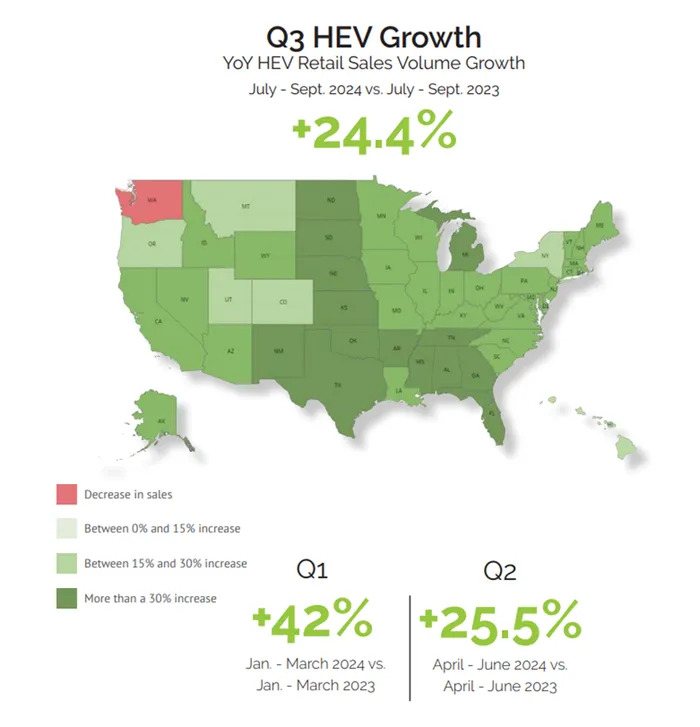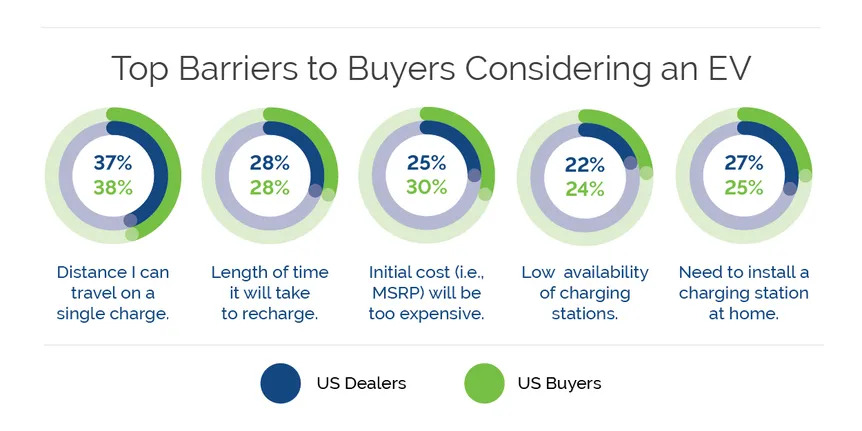-
SOLUTIONS
MANUFACTURER
NETWORKPERFORMANCEProactive network management to connect today’s consumers with automotive more efficiently.
SALESPERFORMANCEUncover what really impacts daily performance to grow market share.
AFTERSALESPERFORMANCEBring customers back to increase service retention and build long-term loyalty.
MARKETINGPERFORMANCEScientific precision to make every marketing dollar work harder.
- RESOURCES
- NEWSROOM
- ABOUT US
- CAREERS
- EVENTS
December 11th, 2024
EV Awareness and Dealer Preparedness: Bridging the Gap to Boost Sales

This article initiates a series analyzing this year’s Urban Science/Harris Poll survey. The survey delves into consumer perceptions of the relevance of the traditional automobile dealership model.
As the auto industry navigates a dynamic market shift, electric vehicles (EVs) and hybrids are gaining ground in the U.S. market, capturing the attention of both consumers and dealers. Yet, despite the momentum, there are notable barriers to adoption and acceptance across the board. Understanding and addressing these barriers can be crucial for dealers’ sustained relevance and profits.
Many consumers, dealers and Original Equipment Manufacturers (OEMs) increasingly believe EVs are the future of U.S. automotive retail market. Dealers can better position themselves to meet this and future market shifts by tailoring strategies to fit local demand, effectively targeting prospective buyers, educating staff and building customer confidence in EVs.
The Market Transition to Hybrids and EVs
The global automotive market is transitional, with hybrid vehicles as a bridge to full electrification. A recent Urban Science study shows that EVs continue to experience consumer interest and sales growth of 15.9% in Q3.
The study also shows that hybrids are the gateway to consumer acceptance for those hesitant to entirely switch from traditional internal combustion engines (ICEs).

Dealers are Critical to EV Ownership
According to a 2024 Urban Science survey conducted by the Harris Poll*, auto buyers report that vehicle affordability (67%) and high gas prices (48%) are their biggest concerns when it comes to purchasing or leasing a vehicle. Those pressures have led consumers to seek budget-friendly alternatives to internal combustion engine (ICE) vehicles. Once consumers purchase EVs, data shows they value dealers more than ICE vehicle owners. EV owners’ belief in dealers’ critical roles extends to service and support.

That reliance on dealers is expected to continue to grow as data shows Gen Z auto buyers (18 -26 year olds)— who are entering and expanding the retail marketplace — rely on dealers for resources, tools and technology.
Dealers share the belief that EVs are the future of personal transportation. Consider these responses from the Urban Science survey:
A majority (63%) of dealers surveyed strongly agree they are confident that EVs will present significant revenue opportunities for their dealerships in the near future. Almost the same number (62%) report they have an effective strategy in place to effectively market and sell EVs. However, General Managers have greater confidence at 68% versus 53% for Sales Managers. It’s critical for dealership management to ensure that their vision and strategies is being communicated to all levels of their staff.
This growth potential is a reason for dealers to feel optimistic and excited about the future of the EV market.
Dealers Work Toward Building Staff, Customer Enthusiasm
A challenge for dealers is transferring their bullish EV outlook onto their staff and consumers.
Dealers will further cement their place as crucial in the automotive retail marketplace by doing so. That’s critical to their business success as they satisfy customers’ needs and show they are ready to face the challenges of the shifting marketplace. As mentioned above, that’s especially true for the up-and-coming Gen Z consumer.
Given the varying levels of enthusiasm, training staff and gaining their buy-in is critical for dealership success, as they are the conduit to the customer. And there is some good news on this front as Urban Science research findings reveal that 38% of EV owners feel very confident that car dealerships will be able to keep up with the changing needs of the future, versus only 19% of ICE-only owners. Beyond that 53% of EV owners strongly agree that dealers play an essential role in the new car buying journey, versus 41% of ICE-only owners.
But despite this vote of confidence amongst EV owners, when looking at overall auto buyers, it’s clear that there are still many barriers to purchase that dealers need to be aware of to tailor their communications and in-person sales conversations.

What Can Dealers Do? A Roadmap for Success
One of the most crucial steps dealers can take is understanding their local market’s unique needs and concerns. For instance, consumers might hesitate to purchase an EV in regions with sparse charging infrastructure. Dealers who prioritize demand forecasting at a local level can offer a product mix and strategies tailored to their area’s adoption rates and infrastructure. This approach can also shape inventory decisions, ensuring the right balance between hybrid and full-EV offerings based on regional interest.
Effective Targeting: Building Audiences Using Timely Data
Dealers who leverage timely data are better positioned to target the right audiences. Using data analytics, dealerships can identify customers most likely to transition to an EV or hybrid based on demographics, purchasing behavior and geographic factors. This allows for precise targeting through digital marketing, personalized messaging, and follow-up campaigns. With these insights, dealers can create advertising campaigns that resonate with these potential buyers, addressing their specific concerns and highlighting relevant incentives.
Price Points: Presenting Value and Lifetime Savings
One effective sales approach emphasizes EV ownership’s potential long-term savings, even if the initial price tag appears daunting. Dealers can educate buyers on the total cost of ownership, including fuel savings, potential tax rebates, and lower maintenance costs compared to ICE vehicles. Providing visual aids or calculators can help customers see how an EV or hybrid might save them money over time, aligning with eco-conscious buyers who consider lifetime costs over upfront expenses. When dealers communicate this effectively, it helps shift the conversation from sticker shock to savings potential.
Test Drives and Incentives: Building Confidence and Familiarity
Offering test drives is essential in helping customers experience the smooth, quiet ride of an EV or the hybrid’s seamless transition between electric and gas power. To make this experience more accessible, some dealerships offer EV or hybrid loaner cars, allowing potential buyers to test these vehicles over a few days. Incentives can be another powerful motivator, as they can make the financial leap into EV ownership less intimidating. Rebates, loyalty programs, and competitive financing options can all drive sales and boost customer confidence.
Consumer Education, Rooted in Dealer Training
Education remains one of the most powerful tools in a dealer’s arsenal. However, successful education begins with a well-prepared team. Sales staff and service teams should be knowledgeable about EV technology, range, maintenance, and cost-saving benefits. This empowers them to address customer questions confidently and proactively educate buyers on EV and hybrid ownership.
The path to EV adoption is not a one-size-fits-all journey. By understanding their market, localizing demand forecasting, effectively targeting their audience, and providing comprehensive education, dealers can help bridge the gap between consumer interest and commitment.
*This survey was conducted online by The Harris Poll on behalf of Urban Science among 3,005 US adults aged 18+ who currently own or lease or plan to purchase or lease a new or used vehicle in the next 12 months (referred to in this report as “auto-buyers” or “auto-buying public”), and 250 U.S. OEM automotive dealers, whose titles were Sales Manager, General Manager, or Principal/VP/Owner.
The auto-buying public survey was conducted from January 4 to February 13, 2024. Data are weighted where necessary by demographics to bring them in line with their actual proportions in the population. The dealer survey was conducted January 5 to February 7, 2024. Results were not weighted and are only representative of those who completed the survey.
The sampling precision of Harris online polls is measured by using a Bayesian credible interval. For this study, the sample data is accurate to within ±2.3 percentage points for US auto-buyers and ±6.2 for U.S. OEM automotive dealer using a 95% confidence level.
For complete survey methodology, including weighting variables and subgroup sample sizes, please contact Amy Bowering (arbowering@urbanscience.com).
Recent insights
April 10th, 2025
Q1 EV Retail Sales Report
This Q1 electric vehicle* (EV) retail sales report features Urban Science’s proprietary 2025 sales insights through March 31st, 2025…
April 2nd, 2025
Urban Science launches new online business planning tool to enhance automaker-dealer alignment and efficiency
New offering creates high-level business plans in minutes, empowers OEMs and dealers to more responsively plan against – and for – transformational market dynamics Urban Science today announced the […]
March 3rd, 2025
Urban Scientists raise $4,600 for LA wildfire relief through company gift-matching campaign
We’re pleased to announce our recent gift-matching campaign raised $4,600 to support wildfire relief efforts in the greater Los Angeles area. Thanks to the generous support of Urban Science employees […]

